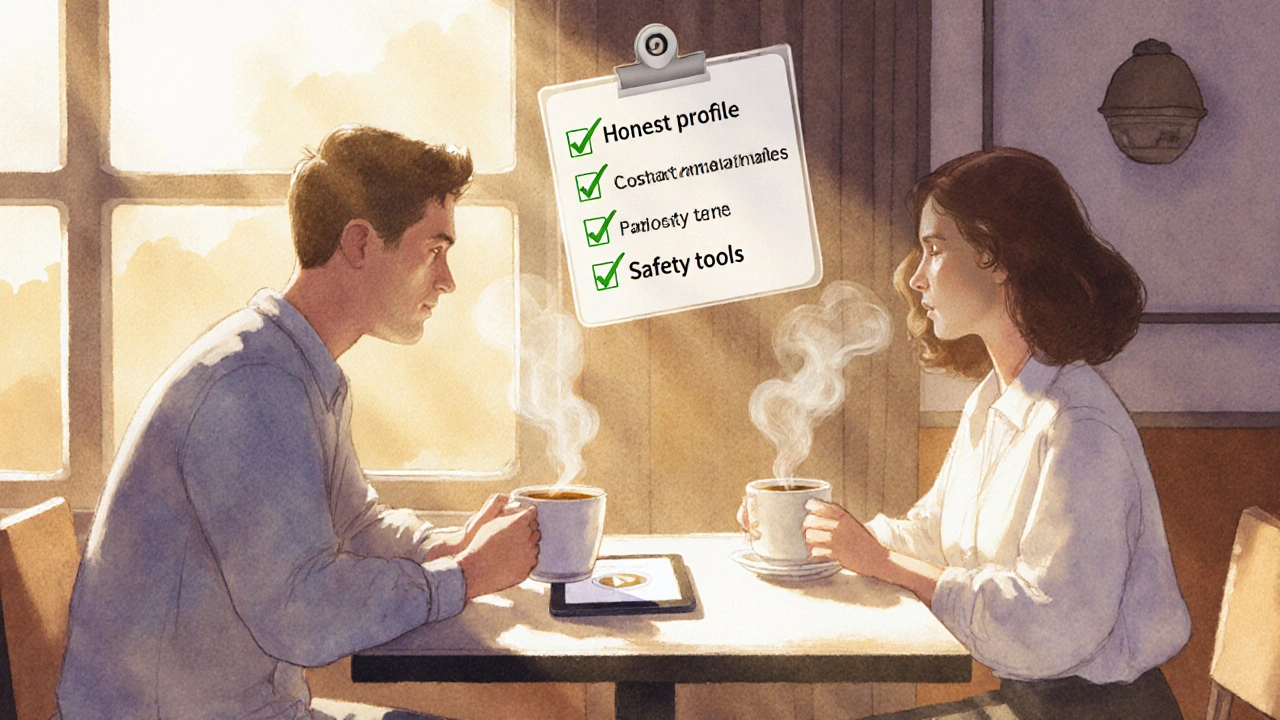Online Dating Success Calculator
This calculator estimates your potential for a happy, long-term relationship based on research from the article. Input your choices and see how your habits compare to successful online daters.
Ever wondered if a swipe can turn into a lifelong partnership? More couples are meeting online than ever before, yet the question remains: does online dating actually help you build a happy, long‑term relationship? Below you’ll find the research, the tech tricks, and the real‑world tips that separate fleeting flings from lasting love.
Quick Takeaways
- Couples who meet online report slightly higher relationship satisfaction than those who meet offline.
- Algorithms that factor in values and personality outperform pure location‑based matching.
- Honest profiles, clear communication, and safety features are the three pillars of lasting online connections.
- Choosing an app designed for serious dating (e.g., Hinge, eHarmony) boosts the odds of a long‑term match.
- A simple checklist can improve your chances of turning a match into a meaningful partnership.
What is Online Dating?
When most people think of online dating is a digital service that matches singles based on preferences, location, and algorithmic scores, they picture endless swipes and quick chats. In reality, modern platforms combine data science, psychology, and community guidelines to create a curated meeting space. The goal isn’t just to get a date; it’s to increase the probability of a compatible, enduring partnership.
How Compatibility Algorithms Work
Behind every match is a compatibility algorithm that processes user inputs-like interests, values, and personality scores-to generate a match ranking. Early systems used simple filters (age, distance), but today’s best algorithms integrate psychometric models such as the Big Five personality traits and attachment styles. By weighting shared values higher than superficial likes, these systems aim to predict long‑term relational success rather than short‑term chemistry.
For example, a 2023 study by the University of Chicago found that couples whose initial match score included a “values alignment” component were 23% more likely to stay together after two years.
Do Online Relationships Last? The Numbers
Statistical evidence suggests that online‑originated couples are not only common-they’re thriving. A 2024 Pew Research survey of 2,500 U.S. adults reported:
- 62% of respondents met their partner online.
- Among those couples, 48% said they are “very happy” in their relationship, compared to 42% of offline‑met couples.
- The average relationship length for online‑met couples was 4.1 years, versus 3.6 years for offline‑met couples.
These figures show a modest but consistent edge for digital matches, especially when the platform emphasizes compatibility over casual encounters.
Three Pillars of a Happy Long‑Term Match
While algorithms set the stage, human behavior writes the script. Research in relationship psychology points to three recurring themes that determine whether an online match blossoms:
- Profile Honesty: Authentic self‑presentation builds trust from the start. Couples who admitted to exaggerating their profiles reported a 15% drop in satisfaction.
- Consistent Communication: Regular, open dialogue reduces uncertainty. A 2022 Journal of Social & Personal Relationships article linked daily meaningful chats in the first month to higher commitment scores.
- Safety and Respect: Features like photo verification, block/report tools, and moderated communities protect users, fostering a sense of security essential for deeper bonding.
Choosing the Right App for Serious Intent
Not all dating platforms are built equal. Some cater to casual meet‑ups, while others lean into relationship building. Below is a quick comparison of three popular apps that explicitly market themselves toward long‑term connections.
| App | Primary Focus | Algorithm Type | Reported Relationship Success Rate | Safety Tools |
|---|---|---|---|---|
| Hinge | Serious dating | Values‑based matching + prompts | ~31% (1‑year follow‑up) | Photo verification, background check integration |
| eHarmony | Long‑term compatibility | Comprehensive psychometric test | ~42% (2‑year follow‑up) | Identity verification, safety center |
| Bumble | Both casual & serious | Location + interest scoring | ~22% (1‑year follow‑up) | Photo verification, block/report, video chat |
Notice how apps that prioritize detailed personality data (eHarmony, Hinge) tend to report higher long‑term success. If your goal is a lasting partnership, those platforms give you a better statistical footing.

Common Pitfalls and How to Dodge Them
Even with the best algorithms, users can sabotage their own chances. Here are the most frequent missteps and practical fixes:
- Over‑filtering: Using too many narrow criteria can limit your pool to the point where matches feel forced. Try widening one or two filters (e.g., age range) to increase diversity.
- Ghosting early on: Disappearing after a few messages erodes trust and lowers overall platform success rates. If interest wanes, a polite “I don’t feel a connection” message is far kinder.
- Relying on appearance alone: Photos are a hook, not a predictor of compatibility. Focus on shared values and communication style during early chats.
Checklist: Building a Relationship That Lasts
Use this step‑by‑step list the next time you swipe right:
- Craft a genuine profile: Include candid photos and a brief story that reflects your core values.
- Choose a relationship‑focused app: Pick platforms like Hinge or eHarmony that emphasize compatibility.
- Complete any personality questionnaires: The more data the algorithm has, the better the match quality.
- Initiate meaningful conversation: Ask open‑ended questions that reveal motivations and life goals.
- Schedule a low‑pressure first meeting: Coffee or a walk lets you gauge chemistry without the extravagance of a dinner.
- Discuss relationship expectations early: Talk about exclusivity, long‑term goals, and what “happiness” looks like for each of you.
- Utilize safety tools: Verify photos, use the platform’s chat until you feel comfortable sharing personal contact info.
Follow these steps, stay patient, and you’ll increase the odds of turning a digital spark into a lasting flame.
Frequently Asked Questions
Do couples who meet online stay together longer than those who meet offline?
Studies from Pew Research (2024) and the University of Chicago (2023) show that online‑originated couples have a slightly higher average relationship length-about 4.1 years versus 3.6 years for offline couples. The difference isn’t huge, but it’s consistent across multiple surveys.
Which dating app has the best success rate for serious relationships?
eHarmony reports the highest two‑year relationship success rate at around 42%, largely due to its in‑depth psychometric matching. Hinge follows with roughly 31% after one year, while more casual platforms like Bumble sit near 22%.
How important is profile honesty for long‑term success?
Very important. Research published in the Journal of Social & Personal Relationships (2022) found that couples who admitted to exaggerating their profiles reported a 15% drop in overall relationship satisfaction.
Can an algorithm truly predict compatibility?
Algorithms improve odds but aren’t foolproof. They excel at highlighting shared values and personality traits, which research links to higher relationship stability. Human factors-communication, mutual effort, and respect-remain decisive.
What safety features should I look for?
Key features include photo verification, background‑check integration, easy block/report options, and encrypted messaging. Platforms that offer a “Safety Center” or in‑app support for harassment are preferable.


Written by Eldridge Fairweather
View all posts by: Eldridge Fairweather